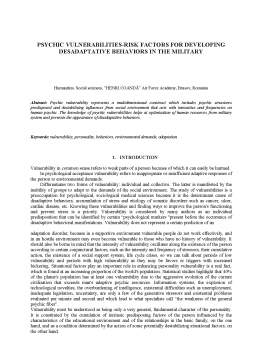Extras din proiect
Abstract: Psychic vulnerability represents a multidimensional construct which includes psychic structures predisposed and destabilizing influences from social environment that acts with intensities and frequencies on human psychic .The knowledge of psychic vulnerabilities helps at optimization of human resources from military system and prevents the appearance of disadaptative behaviors.
Keywords: vulnerability, personality, behaviors, environmental demands, adaptation
1. INTRODUCTION
Vulnerability in common sense refers to weak parts of a person because of which it can easily be harmed.
In psychological acceptance vulnerability refers to inappropriate or insufficient adaptive responses of the person to environmental demands.
Differentiates two forms of vulnerability: individual and collective. The latter is manifested by the inability of groups to adapt to the demands of the social environment. The study of vulnerabilities is a preoccupation for psychological, sociological medical sciences because it is the determinant cause of disadaptive behaviors, accumulation of stress and etiology of somatic disorders such as cancer, ulcer, cardiac disease, etc. Knowing these vulnerabilities and finding ways to improve the person's functioning and prevent stress is a priority. Vulnerability is considered by many authors as an individual predisposition that can be identified by certain “psychological markers "present before the occurrence of disadaptive behavioral manifestations. Vulnerability does not represent a certain prediction of an
adaptation disorder, because in a supportive environment vulnerable people do not work effectively, and in an hostile environment may even become vulnerable to those who have no history of vulnerability. It should also be borne in mind that the intensity of vulnerability oscillates along the existence of the person according to certain conjunctural factors, such as the intensity and frequency of stressors, their cumulative action, the existence of a social support system, life cycle crises, so we can talk about periods of low vulnerability and periods with high vulnerability as they may be favors or triggers with increased bickering. Situational factors play an important role in enhancing personality vulnerability is a real fact, which is found at an increasing proportion of the world's population. Statistical studies highlight that 40% of the planet's population has at least one vulnerability due to the aggressive evolution of the current civilization that exceeds man's adaptive psychic resources. Information systems, the explosion of technological novelties, the overburdening of intelligence, existential difficulties such as unemployment, inadequate legislation, uncertainty, are only a few of the generative stressors and existential problems evaluated per minute and second and which lead to what specialists call “the weakness of the general psychic fiber”.
Vulnerability must be understood as being only a very general, fundamental character of the personality. It is constituted by the cumulation of intrinsic predisposing factors of the person influenced by the characteristics of the educational environment and of the relationships in the basic family, on the one hand, and as a condition determined by the action of some potentially destabilizing situational factors, on the other hand.
Vulnerability is constituted on the individual biography, depending on the psycho-emotional trauma, the experiences of stressful resonances with major resonance, including how they managed to overcome these situations. In search of explanatory patterns of vulnerability, trying to identify earlier the presence of certain indicators that are alarm signals, new concepts derived from the vulnerability study were developed, such as hypersensitivity to vulnerability.
2. HYPERSENSIBILITY TO VULNERABILITY
There are studies that address hypersensitivity to vulnerability, meaning an allergy to daily life to which the person does not have "mental immune resources". Hypersensitive people live and feel the reality deeper than others. Their psychological profile is:
- they are hyperemic, they act mostly emotionally;
- they have a high level of empathy, good intuition and are affected by the experiences of others;
- they have a thrill and romantic attitude of existential sadness;
- are preoccupied with the ideal in love, friendship and work;
- are shy and with lower self-esteem;
- are sensitive to offense, afraid to be left, rejected, judged.
In the vulnerability study, many researches have identified stress as a general marker.
Other studies have focused on generating typical psychological profiles for mentally vulnerable individuals. By applying the personality tests and their statistical analysis correlated with the presence of somatic diseases in the evaluated subjects, some personality traits were identified which, developed exaggerated or accentuated, describe a personality profile with vulnerabilities favoring the occurrence of somatic disorders. He was convinced that the evaluation of the personality and the identification of some enhancements of its is a useful approach to the development of measures to prevent and improve its operation.
Statistical studies agreed that there is an increased likelihood of falling into high personalities when overtaking 55 centiles and more than 70 centiles either in personality disorders or in neurotic syndromes. On this basis, descriptive profiles of vague personalities were drawn up and were described differentiated, the predispositions to the certain somatic and psychic disorders.
Bibliografie
1. Iamandescu, I.B. , (2005). Psihologie medicală. București: Editura Infomedica.
2. Lazarus, R.S. (1999). Stres and emotion: A new synthesis,New York:Springer
3. Matthews G., Deary Ij., Vhiteman MC, (2005). Psihologia personalității, trăsături, cauze, consecințe. Iași: Editura Polirom.
4. Miftode, V. (coord.), (2004). Sociologia populațiilor vulnerabile. Iași: Editura Universității Alexandru Ioan Cuza.
5. Nichita, LY.I., Bertolozzi, MR, Takahashi, RF Fracolli, L.A., The use of ”vulnerability” concept in the nursing area. Rev Lat Am
6. Surtees, P.G., Wainwright, N.W.J.,(1996), Fragile states of mind: Neuroticism, vulnerability and long-term outcome of depression, British Journal of Psychiatry.
Preview document
Conținut arhivă zip
- Psychic vulnerabilities-risk factors for developing desadaptative behaviors in the military.doc






